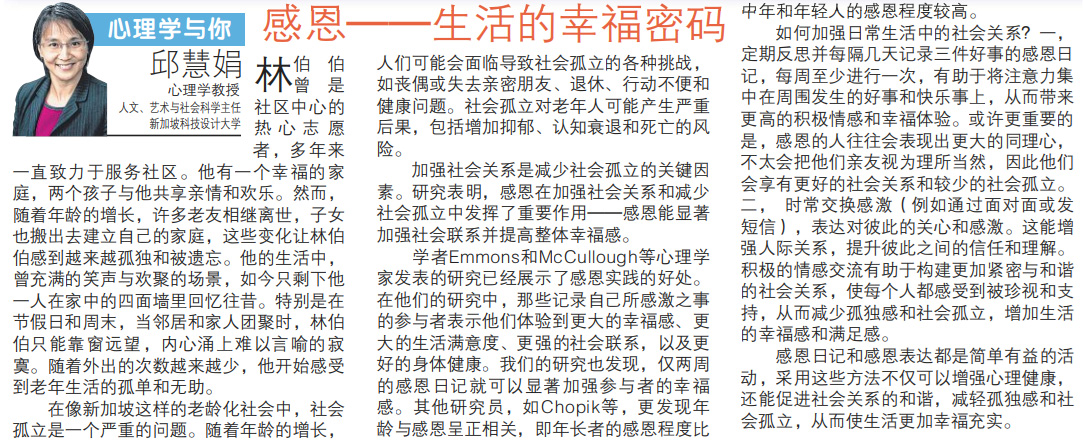Gratitude – the secret to happiness in life
Shin Min Daily News, 13 Apr 2024, Gratitude – the secret to happiness in life (translation)

Uncle Lin is an enthusiastic volunteer at the community centre and has been dedicated to serving the community for many years. He has a happy family with two children at home to share family affection and joy with him. However, as he grew older, many of his old friends passed away and his children moved out to start their own families. These changes made Uncle Lin feel increasingly lonely and forgotten. His life was once filled with scenes of laughter and joyous gatherings, but now he is the only one left to recall the past within the four walls of his home. Especially during the holidays and weekends, when neighbours and family members gather together, Uncle Lin can only look out the window and feel an unspeakable loneliness in his heart. As he went out less and less, he began to feel the loneliness and helplessness of old age.
In an aging society like Singapore, social isolation is a serious problem. As people age, they may face challenges that lead to social isolation, such as being widowed or losing a close friend, retirement, mobility issues and health problems. Social isolation can have serious consequences for older adults, including increased risk of depression, cognitive decline, and death.
Strengthening social connections is a key factor in reducing social isolation. Research shows that gratitude plays an important role in strengthening social connections and reducing social isolation—gratitude can significantly strengthen social connections and improve overall well-being.
Psychologists such as Emmons and McCullough have published research that demonstrated the benefits of gratitude practices. In their study, participants who recorded what they were grateful for reported experiencing greater happiness, greater life satisfaction, stronger social connections, and better physical health. Our study also found that just two weeks of gratitude journaling significantly enhanced participants’ sense of well-being. Other researchers, such as Chopik and others, have found that age is positively correlated with gratitude, that is, older people are more grateful than middle-aged and young people.
How to strengthen social relationships in daily life? First, regularly reflect on and record three good things in a gratitude journal every few days, at least once a week, which helps one to focus on the good and happy things happening around you, thus bringing about increased positive emotions and happiness. Perhaps more importantly, grateful people tend to display greater empathy and take less of their relatives and friends for granted, so they enjoy better social connections and less social isolation.
Second, express gratitude frequently (for example, in person or through text messages) to show care and appreciation for each other. This strengthens relationships and increases trust and understanding between one another.
Positive emotional communication helps build closer and more harmonious social relationships, making everyone feel valued and supported, thereby reducing loneliness and social isolation, and increasing happiness and satisfaction in life.
Gratitude journaling and expressing gratitude are simple, beneficial activities that can not only enhance mental health but also promote harmonious social relationships, reduce loneliness and social isolation, and lead to a happier and more fulfilling life.
